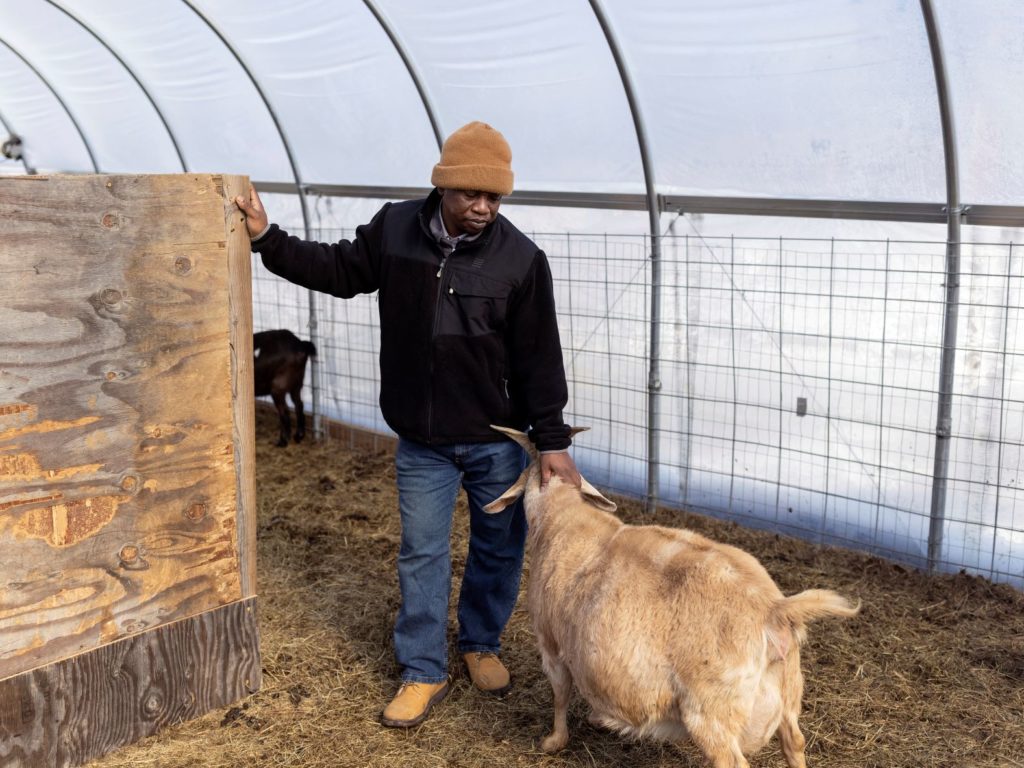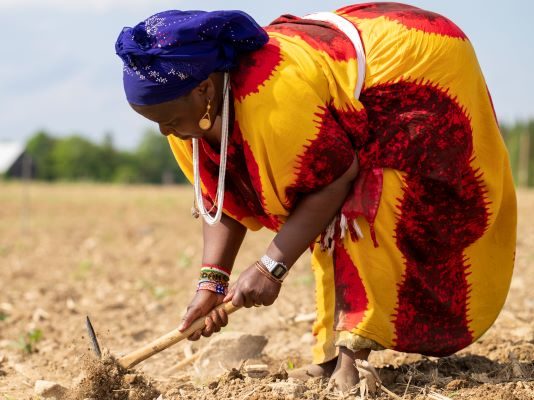
Muhadin Libah, executive director of the Somali Bantu Community Foundation, with goats raised at the Somali Bantu farm in Wales. Brianna Soukup photo
Farming conditions could not be more different here in Maine for Somali Bantu families who once worked the soil in their homeland year-round.
In the arid climate of the Horn of Africa, Bantu people make their living and provide for their families with staples such as corn, beans, and tomatoes. Farming is not only an important industry; the practice is woven into the fabric of communal Somali life.
“In Somalia, our economy and activity are based around farming and producing food,” said Muhidin Libah, executive director of Somali Bantu Community Association (SBCA). “It’s in our culture.”
The nonprofit organization, founded in 2005, provides transportation, interpretation, and immigration services for more than 3,000 Bantus who have resettled in the Lewiston area. Maine Community Foundation has supported SBCA since 2009 with $420,616 in funding through competitive grant programs and donor-advised funds. (An aunt passes her philanthropic values to the next generation)
Liberation Farms, SBCA’s cooperative farm that provides plots for Bantu farmers, began planting in 2014 on leased land from farms in the area. The land provided plots for about 30 Somali Bantu farmers, but the leases were temporary and never guaranteed from season to season.
That all changed in 2020 when the organization purchased a 104-acre farm in Wales that will provide plots for 220 farmers to grow their vegetables. The farm is named Little Jubba Central Maine Central Maine Agrarian Commons, inspired by the Bantus’ ancestral farmland in Somalia’s Jubba River Valley.
The Little Jubba Central Maine Agrarian Commons, in partnership with, Agrarian Trust, Cooperative Development Institute, Land For Good, Land in Common, Maine Farmland Trust, and American Farmland Trust, has become a leader with its cooperative farming model to reduce food insecurity and empower individuals to grow their own food. Liberation Farms received the 2020 Food Sovereignty Prize from the U.S. Food Sovereignty Alliance for its grassroots efforts to provide food security and a financial lifeline to its community and beyond.
Libah hopes the new, permanent home of Liberation Farms in Wales will grow into a large-scale operation so the Bantus can harvest enough crops to make farming a full-time job as it was in Somalia. The farmers now hold other jobs in the community and work the land during free time to help support their families and community.
Four newly constructed greenhouses sit on the property and an additional building for a halal slaughterhouse is in the works. Goats raised for their milk and meat graze on the farm’s grasses, and SBCA will soon have chickens to produce eggs and meat.

In addition to farming, SBCA will use the Wales property to host weddings, dances, and other community gatherings. The Bantus traditionally came from tribal groups and are accustomed to freely coming and going from the homes of friends and family.
“We are creating a community center where our community can have access to talk among friends,” said Libah. “It’s not the same in the United States. The houses are closed, and you have to knock on doors. We want to have a place for retired elders to have coffee, and a place for young kids to connect with their culture.”
SBCA is engaging the next generation through Kasheekee, a youth development program that immerses children in Bantu cultural traditions, dancing, music, art, basket weaving, and storytelling.
After two years of rapid growth, SBCA is now guiding other Bantu communities in New England on how to create successful farming models. And local consumers benefit from the Bantu harvest at farmers markets where they sell their surplus vegetables, which is also served in local schools.
Liberation Farms also contributes to Maine’s grain economy. SBCA partners with Maine Grains in Skowhegan, which processes grains from local farms and packages them for retail.
“SBCA is one of our supplier partners and is very unique and unlike any supplier we work with in Maine,” said Maine Grains co-founder Amber Lambke. “They are planting, cultivating, and harvesting by hand and I don’t know anyone else in the local grain economy doing this.”
Maine Grains purchases Liberation Farms’ white flint corn and mills it into cornmeal. Maine Grains Alliance, the nonprofit arm of the business, provides the farmers with technical assistance and grants to purchase small-scale equipment that complements their farming practices.
Despite the technological advances in grain production, Bantu farmers in Maine remain committed to their traditions. They prefer hand-husking tools for removing corn kernels and using their senses to measure moisture content rather than high-tech monitors.
Their knowledge of farming isn’t lost on Lambke. Maine’s Bantu farmers have succeeded in growing their operation with determination and practices passed down for generations: “The elders in the community can tell you how dry the corn is by the way it sounds and feels in your hand.”





